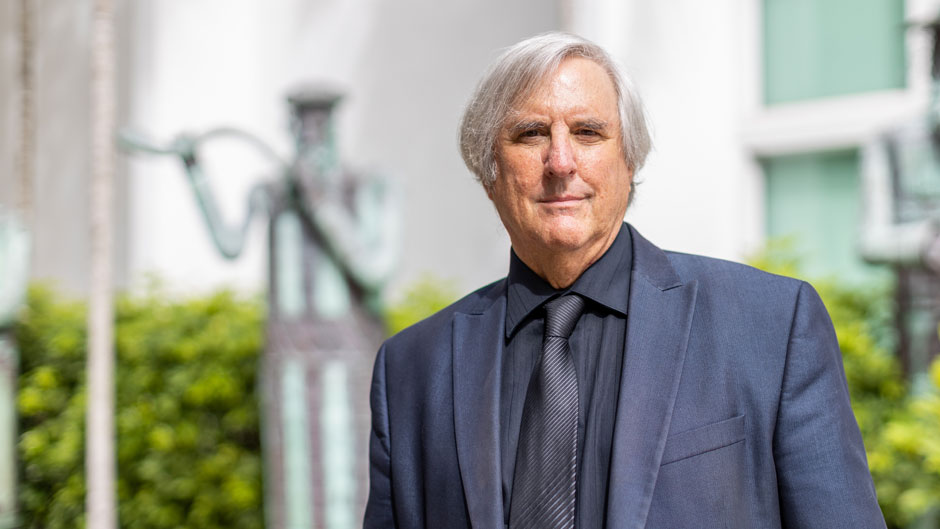A few times a year, professor Ira Sheskin gets a call from a journalist reporting on Jewish people in the United States.
But in the past week, Sheskin has been overwhelmed by a number of phone calls and e-mails. Reporters from The Washington Post, The Times of Israel, the Jewish Telegraphic Agency, The Jerusalem Post, and other outlets have relied on his insight and expertise to describe the close-knit Jewish community of Surfside, Florida, which is reeling after the collapse of a condo building that was home to many Jews.
He is an obvious choice. As one of the nation’s preeminent scholars of U.S. Jewish life and migration, Sheskin is uniquely qualified to describe the South Florida Jewish community. As director of the University of Miami’s Jewish Demography Project, he has been collecting data on Jews in the area for nearly four decades. And despite the tragic circumstances, he feels it is important to share his research on Miami’s Jewish community, which is the third largest in the country after New York and Los Angeles.
“I collected data and analyzed it and now that data is of significant interest and it is being put to a variety of uses,” said Sheskin, who is a past chair of the Department of Geography and Sustainable Development in the College of Arts and Sciences. “That is gratifying because part of my job at the University is community service, and I like producing research that leads to the betterment of society.”
Sheskin’s most recent survey research indicates that the zip code containing Surfside, along with Bal Harbor and Bay Harbor Islands, is one-third Jewish. This is about four times the percentage of Jews in all of South Florida (Miami-Dade, Broward, and Palm Beach counties). About 120,000 Jews live in Miami-Dade, 144,000 live in Broward, and 218,000 in Palm Beach County.
Among Surfside’s Jewish households, about 34 percent are Orthodox, or very observant Jews, while 24 percent practice Conservative Judaism and 18 percent are Reform Judaists. And by checking a database of phone numbers for Champlain Towers South, Sheskin predicts that at least 30 percent of the 136 units in the condo were occupied by Jews.
“Everyone is just devastated about what’s happened there,” he said.
While the Jewish population today in the Miami Beach area is not as concentrated as it was in the 1980s—when Jews made up 70 percent of its residents—Sheskin said that Surfside has a few unique qualities he has learned from research. First of all, 30 percent of its Jewish population is Hispanic, most often from Venezuela, Argentina, and Colombia. Second, the phenomenon of people telling family and friends about Surfside in their home countries has attracted a steady stream of Hispanic Jews to the area. And most of Surfside is walking distance from one of the most successful orthodox synagogues in the country, The Shul of Bal Harbor. The community is also home to kosher markets and restaurants.
“Surfside has built up a reputation in the Conservative and Orthodox Jewish community,” he said, adding that Surfside is also attractive to Orthodox Jews because it has an “eruv,” or barrier, that allows them to carry things between their homes and their synagogue on the Sabbath—when they are not supposed to perform any form of labor.
Although he was raised Jewish in Long Island, New York, Sheskin didn’t initially plan on studying the population. He went to college and graduate school to study geography and started his career at the University in 1977, teaching classes in statistics, research methods, and survey research (which he still does today), while also conducting transportation studies to examine the need for roads and public transportation.
But in 1982, the Greater Miami Jewish Federation wanted a Jewish demographic study completed, and Sheskin won the bid.
“While I am not all that religious, I am very devoted to my Jewish identity and to Jewish culture. So, here was an opportunity for me to combine my personal interest in seeing a strong Jewish community in the U.S. as well as my interest in survey research and geography,” he said.
Since then, he has completed a similar survey for the Greater Miami Jewish Federation each decade and centered much of his research on the migration patterns, characteristics, and voting preferences of U.S. Jews. Although they make up just 2.4 percent of the national population, as Sheskin said, Jewish people have a much larger impact than their numbers indicate.
Also the co-editor of the American Jewish Year Book, Sheskin was involved in national studies by the Jewish Federations of North America, as well as the 2013 and 2020 Pew Research Center’s studies of American Jewry. Therefore, Sheskin can easily rattle off statistics and facts about Jews’ contributions to society.
“Jews are really only 0.2 percent of the world’s population, yet they have won at least 20 percent of Nobel Prizes,” he said, noting that Jewish principles stress education, critical thinking, and charity, which may lead to these accomplishments.
His enthusiasm for the field is still palpable. Sheskin is regularly contacted by Jewish groups from across the country—federations, community centers, day schools, camps, genetic testing organizations, and even cemeteries—to survey their local Jewish populations. These reports help the entities decide where to devote resources, build new facilities, or even to locate bone marrow matches, Sheskin said.
“I love doing this type of research because you can find and create new information,” he said. “And in doing so, I find out things that no one knew existed.”

